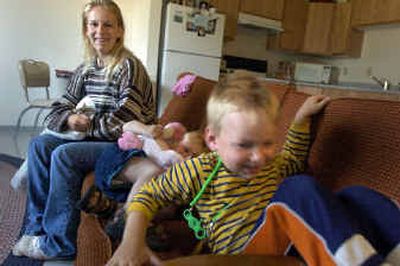A home of their own

Homelessness runs generations deep in Tasha Lantto’s family.
By her teens, she knew well the haunts of the homeless – the aging motel rooms, the drug houses, the crowded shelters with stacked bunk beds.
As an adult and the mother of two children, she sought out abandoned homes, slipping through the windows or past broken door latches to curl up with her children on the floor. They went without electricity, running water or beds as Lantto fought her addiction to methamphetamine.
“I was breaking my mom’s heart,” said Lantto, now 22. “It had to change.”
This week, it did. Lantto moved her two children into a new 30-unit housing complex opened by the Salvation Army. The apartments are part of a two-block project by the Salvation Army that will eventually include a food bank, emergency shelter and social service offices.
The campus reflects a growing consciousness that although the homeless can survive with only hot meals and shelter beds, they often need more to thrive.
Lantto believes she has a chance to break her family’s cycle of homelessness – a new buzz phrase that reflects the generational struggles of some families. Homelessness is sometimes passed down by parents, social activists say.
“I’m seeing more and more generational homelessness,” said Gerriann Armstrong, director of the apartments. “I’m seeing kids of the parents I worked with 10 years ago who are now adults.”
Now sober for more than a year, Lantto signed on to strict policies that include a ban on drinking and smoking and a pledge to attend life-skills programs. She can take classes to learn how to write resumes, prepare for job interviews or balance a checkbook.
“We want to help these families get solid legs under them so that they can stand on their own,” Armstrong said.
In recent weeks, homeless activists have brought attention to the needs of people living on the streets or outdoors. But Lantto represents another face of the city’s 9,000 homeless: those who often have a roof over their head but no place to call home.
Under the rental agreement, she can stay at the housing complex for as long as two years. The apartments are restricted to extremely low-income families, a limit of $14,750 a year for a family of three.
Her first-floor apartment, with three bedrooms and a new kitchen, might fetch $700 to $900 a month on the open market, Armstrong said. But Lantto pays only $140 a month, or 30 percent of her income.
In her fight against homelessness, Lantto has found an ally in her mother, Patty Degenstein, a former cocktail waitress who raised her daughter, for a time, in shelters and flophouses.
A decade ago, poverty drove Degenstein and Lantto out of rural Newport and into Spokane, where they could receive help. As Degenstein remembers, a social service agency placed the two in a motel room, a situation that provided them a bed but little else.
From there, they bounced from shelters to drug houses, and Lantto quickly grew accustomed to the prostitutes working the streets outside and the drug dealers trolling inside.
“My mom tried to protect me from it, but they were pretty inviting,” Lantto said.
By her early 20s, Lantto had stumbled into drug abuse. At her low point, she turned herself in to the state’s Child Protective Services, afraid for the health of her children.
While Lantto went through rehab, her mother took in her children. Degenstein feared her grandchildren – blond, bright-eyed and energetic – would always struggle with homelessness.
But to her mother’s delight, Lantto finished treatment and has stayed clean.
“She’s made my dreams come true,” Degenstein said.
This week, Lantto became the first renter in the Salvation Army’s new center. The floors and walls are bright and clean, and the rooms dwarf her spare furnishings. She doesn’t yet have a bed for her son, so they slept in her room huddled together on a single mattress laid on the tile floor.
“I slept better than I ever had,” she said.